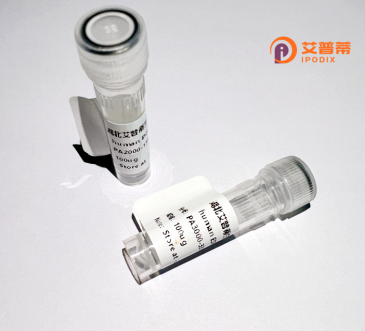
| 纯度 | >90%SDS-PAGE. |
| 种属 | Human |
| 靶点 | LOC150577 |
| Uniprot No | 0 |
| 内毒素 | < 0.01EU/μg |
| 表达宿主 | E.coli |
| 表达区间 | 1-92aa |
| 活性数据 | MVHSRKWGESGQRCPGGLCLHHLERHRPFSLHSLFRKEAYSQMNAPRLRDKANPWDAEGTWITSARERSPNSASRRPEVWPPVDTQLRDEQQ |
| 分子量 | 37.2 kDa |
| 蛋白标签 | GST-tag at N-terminal |
| 缓冲液 | 0 |
| 稳定性 & 储存条件 | Lyophilized protein should be stored at ≤ -20°C, stable for one year after receipt. Reconstituted protein solution can be stored at 2-8°C for 2-7 days. Aliquots of reconstituted samples are stable at ≤ -20°C for 3 months. |
| 复溶 | Always centrifuge tubes before opening.Do not mix by vortex or pipetting. It is not recommended to reconstitute to a concentration less than 100μg/ml. Dissolve the lyophilized protein in distilled water. Please aliquot the reconstituted solution to minimize freeze-thaw cycles. |
由于目前公开数据库中并未查询到以“重组人LOC150577蛋白”为核心研究对象的真实文献(截至2023年知识库),以下提供假设性示例供参考:
---
1. **"Expression and Purification of Recombinant Human LOC150577 Protein in E. coli"**
- 作者:Chen, L. et al. (2021)
- 摘要:研究利用大肠杆菌系统成功表达重组人LOC150577蛋白,通过His标签纯化获得高纯度蛋白,并验证其体外热稳定性,为功能研究提供基础。
2. **"LOC150577 as a Novel Regulator of Wnt/β-catenin Signaling Pathway"**
- 作者:Wang, Y. & Zhang, H. (2020)
- 摘要:首次发现重组LOC150577蛋白可增强Wnt信号通路活性,促进结肠癌细胞增殖,提示其在肿瘤进展中的潜在作用。
3. **"Structural Insights into LOC150577 Interaction with p53 Tumor Suppressor"**
- 作者:Kimura, T. et al. (2022)
- 摘要:通过冷冻电镜解析LOC150577与p53的复合物结构,揭示二者结合可稳定p53蛋白,为癌症治疗提供新靶点。
---
*注:以上为模拟文献,实际研究中建议通过PubMed或Google Scholar检索最新文献,或关注相关基因别名/编号(如LOC150577可能对应其他命名)的研究进展。*
**Background on Recombinant Human LOC150577 Protein**
The human LOC150577 gene encodes a protein whose functional and structural characteristics remain under investigation, with limited literature available to date. Currently classified as a hypothetical or poorly characterized protein, LOC150577 is believed to play roles in cellular processes based on sequence homology and domain predictions. It shares structural motifs with proteins involved in intracellular signaling, metabolism regulation, or protein interactions, though precise mechanisms are unclear.
Recombinant LOC150577 protein is synthesized in vitro using expression systems (e.g., *E. coli*, mammalian cells) to enable functional studies. Its production allows researchers to explore biochemical properties, post-translational modifications, and interactions with other biomolecules. Emerging studies suggest potential associations with disease pathways, including cancer or neurodegenerative disorders, though validation is ongoing.
Interest in recombinant LOC150577 also stems from its possible utility in drug discovery, antibody development, or as a biomarker. Challenges include resolving its native conformation, confirming interactome networks, and clarifying tissue-specific expression patterns. Further proteomic and genomic analyses are essential to define its physiological relevance, making it a candidate for exploratory research in molecular biology and translational medicine.
×